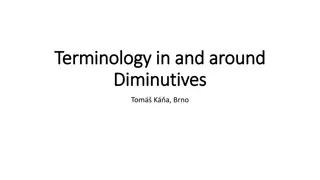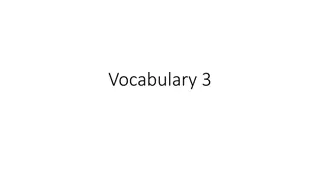
Spanish Language Word Formation Rules
Learn about diminutives and augmentatives in Spanish, including rules for forming diminutives and augmentatives, examples, and practice exercises. Discover how words change in meaning when in diminutive form and how to create augmentatives using specific endings. Practice forming words with different sizes and meanings.
Download Presentation

Please find below an Image/Link to download the presentation.
The content on the website is provided AS IS for your information and personal use only. It may not be sold, licensed, or shared on other websites without obtaining consent from the author. If you encounter any issues during the download, it is possible that the publisher has removed the file from their server.
You are allowed to download the files provided on this website for personal or commercial use, subject to the condition that they are used lawfully. All files are the property of their respective owners.
The content on the website is provided AS IS for your information and personal use only. It may not be sold, licensed, or shared on other websites without obtaining consent from the author.
E N D
Presentation Transcript
DIMINUTIVES AND AUGMENTATIVES
DIMINUTIVES: For words ending in a vowel (except e ) use the endings - ito(a) or illo(a): ahora ahorita vino - vinito Bajo bajito falda - faldita Gordo gordito galleta - galletita Mesa mesita perro - perrito Copa copita amigo - amiguito
DIMINUTIVES For words ending in e , n and r use the endings cito(a) or cillo(a) : amor amorcito Ram n Ramoncito hombre - hombrecillo For one syllable words use ecito(a) or ecillo(a) : flor florecita pez - pececito pan panecillo (roll) luz - lucecita
DIMINUTIVES: Some words change meaning in the diminutive state: manzana (apple) manzanilla (camomile) bomba (bomb) - bombilla (lightbulb)
AUGMENTATIVES: Use these endings: - n / ona - ote / ota - azo / aza grande grandote/a perro perrazo casa casona palabra palabrota silla sill n flecha - flechazo cabeza - cabezota caja - caj n
PRACTICA: 1. muy grande ____________ 6. estrella peque a _____________ 2. agujero peque o ____________ 7. hombre alto y fuerte ______________ 3. cuarto grande _____________ 8. muy cerca ____________ 4. sillas para ni os ____________ 9. abuelo querido ______________ 5. libro grande ______________ 10. hombres que piensan que siempre tienen la raz n _______________


